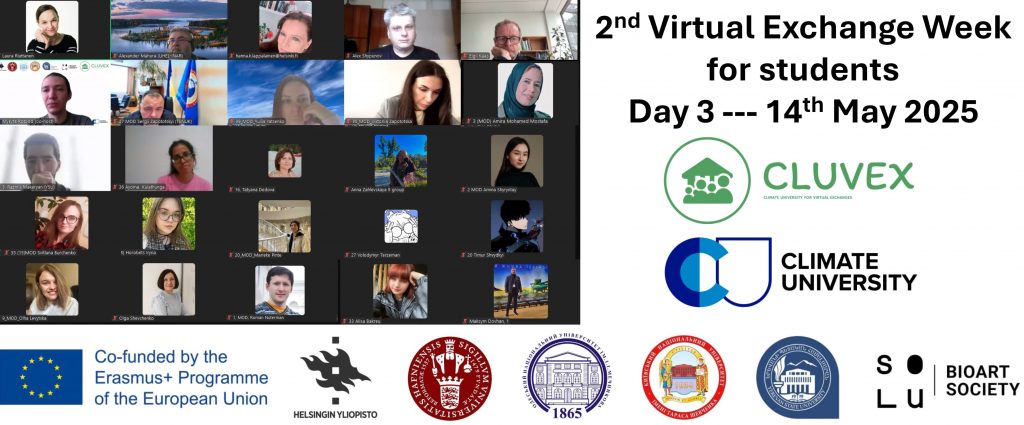The 3rd day, 14th May 2025, of the CLUVEX 2nd Virtual Exchange (VE) Week successfully continued. The VE Week is hosted by Maher Sahyoun from the University of Copenhagen (UCPH), Denmark and Mykota Rozvod from the Mechnikov National University (ONU), Ukraine.

On 14th May, on the third day of the VE Week, more than 160 participants attended in Zoom. The Poll of the day showed that participants’ think about the biggest challenges behind the climate change such as: dirty industries – 32%, consumerism – 19%, greed and selfishness – 16%, overpopulation – 13%, political system – 18%, and several participants mentioned that all mentioned above are the biggest challenges.
The new tool “Shared Socioeconomic Pathways (SSPs)” as a global scenario framework as introduction to exercises on socioeconomical trajectories was delivered (video recording) by Dr. Stefan Fronzek, Finnish Environmental Institute, Helsinki. Presentation included scenarios for climate change research; SSP-based global scenario framework (narrative as sketch and storyline; quantitative elements as population, urbanization, rates of technological change, human development index, income distribution) with changes to mitigation and adaptation. To resolve the challenges, a different pathway along the “road” can be taken such as highway (fossil-fuel development), green road (sustainability), rocky road (regional rivalry), divided road (inequality), and middle of the road. It was demonstrated on example of Finland for socio-economic narratives for agriculture and food sector, for health and social welfare.
This tool, the Shared Socioeconomic Pathways (SSPs), as well as two other tools – the already introduced the ERA-5 Past Climate Explorer (PCE) tool and the IPCC Web-based Atlas (to be presented on 4th day of the VE Week) to be actively used by participants working on the Individual/ Personal and Collaborative/ Joint Climate Horizon exercises during the VE Week.
More details about materials in DigiCampus, daily assignments, aspects of the CLUVEX Climate Horizon exercise were given by Dr. Laura Riuttanen, Univ Helsinki. Following 3 suggested approaches – (1) utilizing tools for climate related data visualization, analysis and interpretation; (2) preparing a reflective text; and (3) visual reflection using images – the students have a choice to select and implement in the Climate Horizon exercise.
For the 1st approach, students have to imagine what a hopeful future would look like from climate change perspective; to select one of the data visualization tools demonstrated; to choose an area and parameters that are meaningful to student’s Climate Horizon, to take screenshots and to write a brief description that captures student’s Climate Horizon.
For the 2nd approach, students have to prepare a reflective text by writing about the thoughts and emotions student encountered during the VE; to include info from lectures, exercises, and discussions; to reflect own experiences – life and study experiences before VE and personal experience during VE and most importantly – the future; to include a reflection on group discussions (by writing down a couple of thoughts after each day). The implementation of the final report can be as: a learning diary, a short reflective essay, a letter to group.
For the 3rd approach, it can be an electronic collage for instance. For this implementation, students need to find pictures (or take own) reflecting the themes of VE and personal emotions and thoughts; to draw or paint if that is strong suit; to create own Climate Horizon, a hopeful state of the future, using images or drawings.
After the demonstration of the Shared Socioeconomic Pathways (SSPs) tool and more detailed explanation of the Climate Horizon exercise, the VE Week participants were redistributed again into the same small groups (with the moderator) in zoom break-out-rooms as on the previous days to continue during 2 hours online discussions, practicing with the tool demonstrated, independently working on individual/ personal Climate Horizon exercise as well continued discussions on collaborative/ joint Climate Horizon.
If you are interested in further details of the CLUVEX project, please, contact the CLUVEX team members.
If you are interested to participate the project, please leave your own contact information here and we will get back to you.
